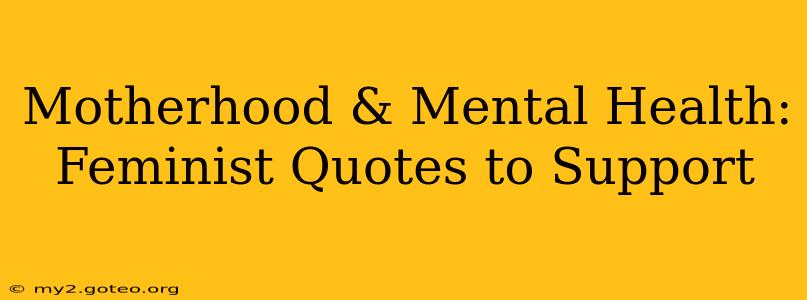Motherhood is a transformative experience, often romanticized but rarely depicted with the full spectrum of its emotional realities. For many women, the journey is punctuated by immense joy alongside unexpected challenges, including significant mental health struggles. The intersection of motherhood and mental health is a critical topic, and a feminist perspective offers crucial support and understanding. This exploration delves into the complex interplay between motherhood and mental well-being, drawing upon powerful feminist quotes to illuminate the often-unseen struggles and celebrate the resilience of mothers.
What are the common mental health challenges faced by mothers?
Postpartum depression (PPD) is a widely recognized challenge, affecting a significant percentage of new mothers. However, the range of mental health issues extending beyond PPD is vast and often under-diagnosed. Anxiety, stress, panic attacks, and even psychosis can emerge during pregnancy, postpartum, or throughout the child-rearing years. The societal pressure to conform to a "perfect mother" ideal exacerbates these challenges, creating a climate of shame and silence.
How does societal pressure affect mothers' mental health?
The unrealistic expectations placed upon mothers by society contribute significantly to mental health struggles. The pressure to be simultaneously a super-efficient professional, a nurturing caregiver, and a flawlessly put-together individual is unsustainable. This pressure is amplified by social media's curated portrayals of motherhood, further isolating and stigmatizing those who experience difficulties. Feminist voices have long challenged these unrealistic ideals, advocating for a more compassionate and realistic understanding of the motherhood experience.
"We can do it all. But not all at once. And definitely not all at the same time." - Unknown
This quote perfectly encapsulates the impossible standards imposed upon modern mothers. The attempt to balance multiple roles often leads to burnout, exhaustion, and a decline in mental well-being. Acknowledging these limitations is a crucial step towards self-compassion and seeking support.
What support systems are available for mothers struggling with mental health?
Fortunately, resources for mothers struggling with mental health are expanding. Therapists specializing in perinatal mental health offer crucial support and guidance. Support groups connect mothers with shared experiences, fostering a sense of community and reducing feelings of isolation. Online resources and helplines provide valuable information and immediate access to assistance.
How can feminist perspectives help us understand and address mothers' mental health challenges?
Feminist perspectives provide essential frameworks for understanding and addressing mothers' mental health challenges. They challenge the patriarchal structures that contribute to unrealistic expectations and stigmatization. Feminist thought emphasizes the importance of self-care, mutual support, and systemic change to create a more equitable and nurturing environment for mothers and families. By rejecting the notion of the "ideal mother," we can embrace a more inclusive and compassionate approach to motherhood.
"The most common way people give up their power is by thinking they don’t have any." - Alice Walker
This quote reminds us that seeking help is a sign of strength, not weakness. Mothers struggling with mental health should not feel ashamed or powerless to reach out for support. Taking control of one's well-being is a crucial act of self-preservation.
What are the long-term effects of untreated mental health issues during motherhood?
Untreated mental health issues during motherhood can have far-reaching consequences. It can affect the mother-child relationship, impact child development, and contribute to long-term mental health challenges for both the mother and the child. Early intervention and ongoing support are crucial to mitigate these potential risks.
How can we create a more supportive society for mothers?
Creating a more supportive society for mothers requires a multifaceted approach. This includes challenging unrealistic societal expectations, promoting open conversations about mental health, expanding access to mental healthcare services, and implementing policies that support parents, such as paid parental leave and affordable childcare. Only through collective action can we create a world where motherhood is celebrated in all its complexity and mothers are empowered to prioritize their well-being.
"Women must try to do things as men have tried. When they fail, their failure will be a challenge to others." – Virginia Woolf
This quote reminds us that progress requires persistence and that the struggles faced by mothers today pave the way for future generations to experience greater support and understanding. The ongoing fight for better mental health resources and more compassionate societal attitudes towards motherhood is a vital feminist endeavor.
By embracing a feminist perspective and amplifying the voices of mothers, we can work towards a future where motherhood is a journey of joy, resilience, and genuine well-being for all.

